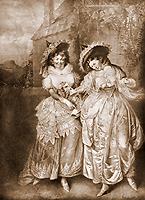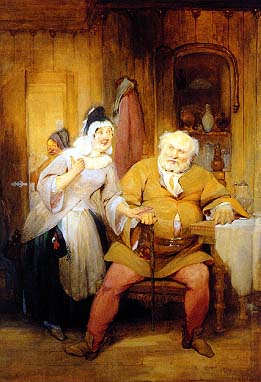ACT II
SCENE i
Mistress Page reads Falstaff's dorky letter, is outraged, and wants to get even for this cheesiness. Mistress Ford arrives with allusions to being propositioned, and Page shows her the identical letter delievered to her: "Letter for letter; but that the name ... differs! ... I warrant he hath a thousand of these letters, writ with a blank space for different names (sure, more!); and these are of the second edition" (II.i.70-77). This is intriguing material if Shakespeare did indeed renovate an old play to force in the beloved characters here.
Mention of the clash of trying to sing "the hundred Psalms to the tune of 'Greensleeves'" (II.i.62-63) may connect with A Handfull of Pleasant Delites wherein appears an anonymous lyric to be sung to the Greensleeves tune (Ogburn and Ogburn 745).

